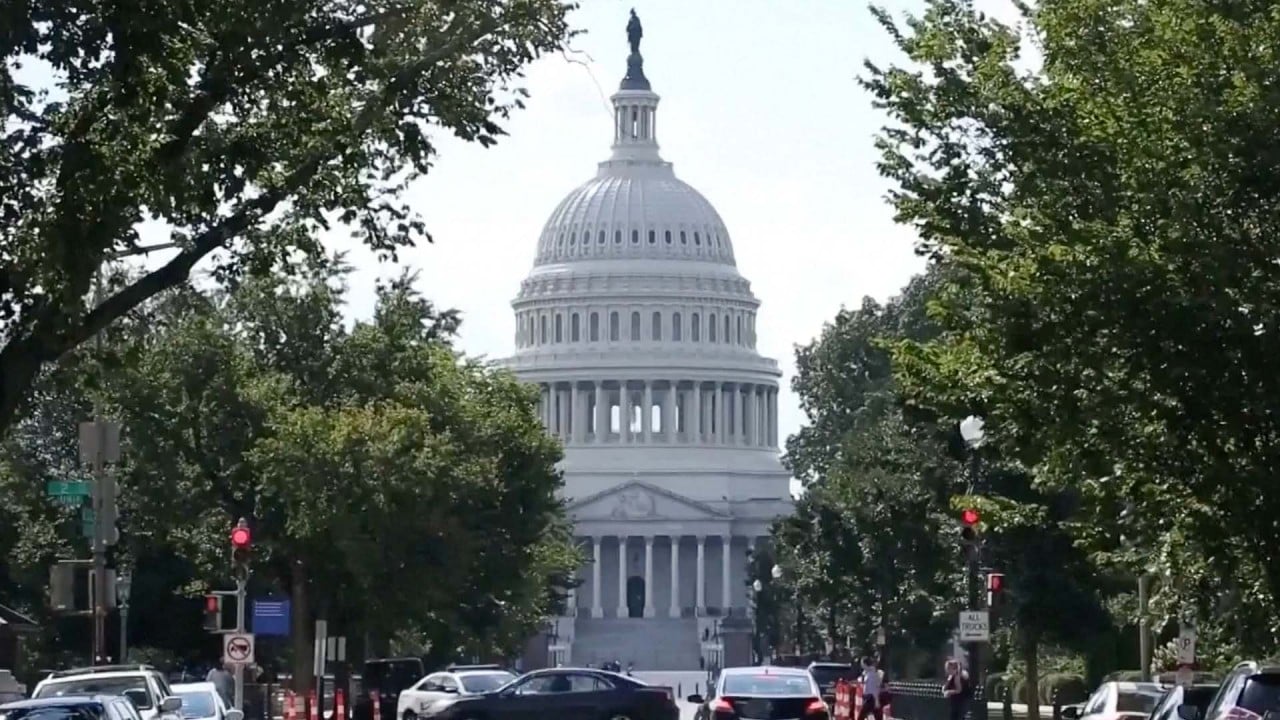
Tsai Ing-wen tells new US delegation to Taiwan the chip supply chain is vital to security
- Taiwanese president tells Indiana State Governor Eric Holcomb, ‘democratic allies must stand together and boost cooperation across all areas’
- ‘Distorted and hegemonic logic’: mainland foreign ministry rejects US ambassador’s statement that Beijing is an agent of instability in the Taiwan Strait
“Economic security is an important pillar of national and regional security. Taiwan is willing and able to strengthen cooperation with democratic partners in building sustainable supply chains for democracy chips,” Tsai said in a meeting with Indiana State Governor Eric Holcomb and his delegation at her office in Taipei on Monday.
“At this moment democratic allies must stand together and boost cooperation across all areas,” Tsai said, adding that continued visits by senior US politicians reflected America’s rock-solid support and friendship with Taiwan, which she said would further deepen Taipei’s cooperation with Washington in a range of areas.
Tsai said Taiwan and the US were democracy-loving and freedom-loving partners, as well as key security and economic allies in the Indo-Pacific region.
During the meeting, Holcomb emphasised the economic nature of his visit, saying Indiana was among the top US states for direct foreign investment and was home to 10 Taiwanese companies.
“We are so grateful for our enduring friendship and partnerships that have been built over the years and the strong bond that you talked about that grows even stronger by the day – as strong as the Indiana limestone that we’re famous for producing,” he said.
He also said some of the main areas for future bilateral cooperation would include advancing manufacturing, bioscience and renewable energy, as well as economic and academic collaboration between Taiwan and Indiana.
Limited impact from military drills around Taiwan, US business group says
During his four-day trip to Taiwan which began on Sunday, Holcomb was expected to meet representatives of the semiconductor industry and sign cooperation agreements to promote academic and technology ties between Taiwan and Indiana.
The delegation is due to visit National Yang-Ming University and National Cheng Kung University as part of the exchange.
The visit is expected to draw further condemnation from Beijing. Pelosi was the highest-level member of the US government to visit Taiwan in 25 years and her trip, which enraged mainland authorities, was labelled as a “provocation” by Beijing for violating its sovereignty over Taiwan and breaching the one-China principle.
Beijing sees the island as part of China and has never ruled out the use of force to take control of it. Most countries, including the US, do not recognise Taiwan as an independent state. Washington, which recognises Beijing diplomatically instead of Taipei, however, opposes any attempt to take the island by force.
Beijing responded to the Pelosi visit with live-fire drills around Taiwan, including firing ballistic missiles across the island and sending warplanes over the median line in the Taiwan Strait.
Although Pelosi’s visit was supported by a number of bipartisan US politicians and welcomed as a sign of deepening US-Taiwan ties by the self-governed island, former US secretary of state and national security adviser Henry Kissinger thought it was an unwise move.
In a podcast with CNN on Sunday, Kissinger called the visit “just one more drop of water”, which gave Beijing “an opportunity to threaten explicitly how they might blockade Taiwan”.
“The Pelosi trip is just one example of an attempt by someone outside to deal with its issue on the basis of confrontation, and when bad things happen and threatening things happen, we must be willing to confront,” he said.
“But on this overriding issue of war and peace, I think we need new approaches for both sides. We can’t do it alone … I am very uneasy, where it goes from here on Taiwan.”
Communist Party leadership changes that could impact Beijing’s Taiwan policy
On Monday, China’s foreign ministry rejected comments by US ambassador Nicholas Burns last week that Beijing had overreacted to Pelosi’s Taiwan visit and that it had become an agent of instability in the Taiwan Strait. Beijing said the comments were “confusing right with wrong”.
“[This] once again shows the US’ distorted and hegemonic logic,” the ministry said in a statement, adding that Beijing had repeatedly warned Washington about the trip and the serious harm it would bring, as well as potential consequences.
It said that instead of reflecting on its wrongdoing and changing course, the US had sought to blame Beijing. Reiterating that the one-China principle was among Beijing’s core interests, the ministry said the mainland government would do all it could to “defend sovereignty and territorial integrity and to achieve national reunification and rejuvenation”. It asked the US to respect Beijing’s rights and refrain from meddling in its internal affairs.



.jpg?itok=8c4YEnI0)